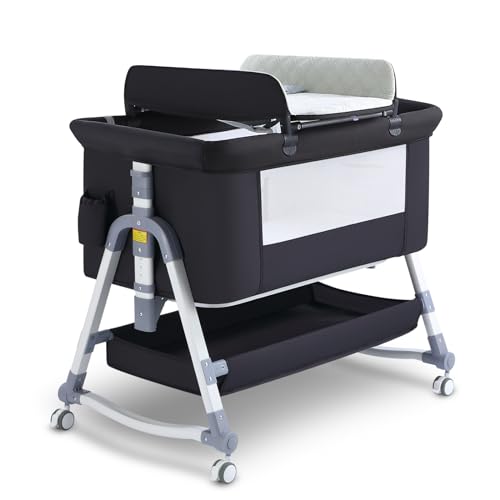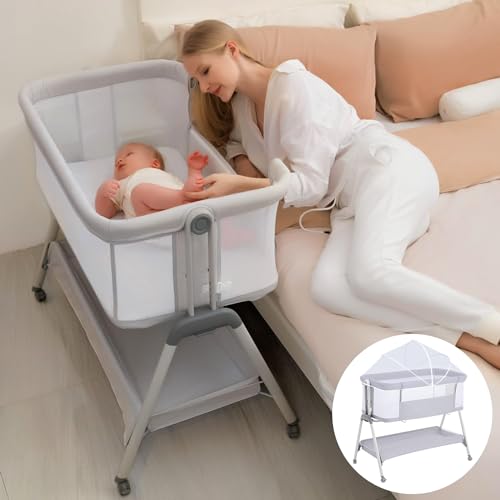The 9 Things Your Parents Taught You About Bedside Crib Vs Cot
Julia
0
3
01.07 12:16
 Bedside Crib Vs Cot
Bedside Crib Vs CotA bedside rocking crib crib (also known as a co-sleeper) allows your baby to rest close to you during the night. It is important to adhere to the official safe sleep guidelines from the NHS and Lullaby Trust.
Our mum testers love the SnuzPod's breastfeeding-friendly drop side, 30-second open and fold mechanism and reflux incline function. Plus, its slim frame makes it easy to move from room room.
Safety
Many new mums desire the intimacy of their baby whilst they sleep, and bedside cribs can be a safe alternative for families who want to co-sleep. NHS Safe Sleep advises parents to choose a separate bed for their child and avoid sharing a mattress in order to reduce the risk of suffocation and overheating.
It is important that when selecting the crib you will use for your baby, you check to ensure that it complies with European safety standards. Also, make sure the crib adheres to Lullaby trust codes for safe sleep to ensure he is sleeping in a place that is secure and safe. Bedside cribs with adjustable height settings can be matched to the parent's bed frame to decrease the chance of infants being trapped in gaps. They also come with a firm, flat mattress that is breathable and designed to promote healthy sleeping habits.
Most bedside cribs feature a panel which can be adjusted to allow you to safely monitor your baby during the night. This means that you can easily comfort them, feed and monitor them without needing to get out of bed, which is especially beneficial for mothers recovering from c-section births, or those who are unable to move. Certain models, like the SnuzPod4, offer a reflux incline feature for babies who have reflux or digestive issues.
A lowered panel will also lower the risk of your child falling over the edge of the bed. Many of these panels have mesh sides to prevent pillows and duvets from falling into the crib. This is crucial to reduce the risk of SIDS, as babies that fall off their backs are more at risk of dying from suffocation.
Keep dummies and soft toys away from the area as they could pose suffocation risks. A breathable crib mattress and regular checks for any gaps or loose bedding are essential to ensure your baby is safe. When your baby is able to sit up or stand (typically at the age of 6 months), they will need a cot or other sleeping arrangement that is suitable for. If you're worried about this transition, it's worthwhile to talk to your GP or health care professional.
Comfort
The best cribs for bedside sleeper cot use provide a safe and comfortable space to sleep your baby. Designed to sit next to your bed, they will let you take care of your little one without having to get out of bed. They also give you the opportunity to bond with your infant in those precious early months. This sense of security can help establish positive nighttime routines and improve the overall quality of your baby's sleep.
It is recommended to keep your baby in a crib by the bed until they reach six months old or able to push themselves up and then you should move them to an old-fashioned cot. The bedside crib will usually be suitable for your child until the age of 6 months, but it's crucial to review the specific guidelines for the product.
When selecting a bedside crib, ensure that it meets EN 1130 safety standards. It should also be compatible with your existing bed (most attach to standard bed frames but you should always double check the exact dimensions). It is crucial that the mattress of your crib is firm, flat and ventilated. This is essential for the health of your baby.
The Chicco Next2me side sleeping crib is a favorite among our mum testers. It comes with a height-adjustable base that can be used as a stand-alone crib, or connected to the bed. The crib is light and easy to assemble. It also provides great value for money. One of our top picks is the Silvercross Voyager, which our testers love because of its versatility, breathable mattress and reflux incline function.
Space
A bedside crib is a sleeping space that can be secured to the sides of your bed and allows you to keep your baby close during the night without having to worry about the risk of co-sleeping (which is not recommended by The Lullaby Trust and NHS). They've seen a rise in popularity recently with mums looking for ways to bond with their newborn while also being secure.
They typically feature a lowering panel, which you can use to safely be able to touch and observe your baby, as well as some that allow you to keep the panel closed at night for the convenience of fuss-free feeding and monitoring. Some models have the ability to tilt your baby's stomach, which many of our test moms appreciated for aiding digestion and alleviating discomfort for infants suffering from reflux or wind.
Some cribs with adjustable height settings that allow you to set them at the same height as your mattress, which means there's no gap that could let your baby climb or slip out. This is a huge benefit for those recovering from C-sections since it can be a challenge to get into and out of bed while your body heals.
The lowered sides also offer some privacy, which makes them ideal for parents who are concerned about sharing a room with their infant. But, it's important to note that if you opt to sleep with your baby in a bedside baby sleeper crib or cot, it's still best practice to adhere to the official safe sleeping guidance and not share your bed.
You'll also need to ensure that your 4-in-1 bedside crib crib is compatible with your own bed frame before buying - some bedsteads clip onto bed frames while others are more suitable for divan beds. Don't forget to purchase a mattress that is suitable for your crib. They are typically sold separately from the crib and must meet the latest BS EN1130:2019 safety standards.
Some cribs that are bedside cot co sleeper can be converted into toddler beds, which can increase longevity for parents who don't want to buy a separate crib for their child who is older. SnuzPod4 is a sleek frame that can be tucked away in the corner of any room and offers plenty of space for your child to sleep comfortably. It's also easy to assemble, and comes with a handy bag for traveling.
Convenience
One of the best things about a crib for bed is that it's simple to get your baby in and out of bed for nighttime feeds, cuddles and soothing back to sleep. Many cribs come with a side panel which can be set to a lower level to allow you to communicate with your baby without waking them up. Some cribs keep the side panel open all the time. This is perfect for parents who have had C-sections who wish to keep their baby close.
Some cribs offer tilt options, which can help with colic and reflux. It is important to remember that tilting the crib should only be performed by parents who are aware of their baby's medical needs and their history.
Another thing to think about is how easy it is to clean and whether it can be washed by machine or you have to wash it by hand it. Some cribs come with waterproof covers that protect against leaky nappies, baby sick and dribbles. Some also have a handy storage bag, making them ideal for travel if you have to bring your baby along with you.
Also, you should consider the weight of the crib and is it easy to move from room room. Our 2021 Mother & Baby awards mum tester Jasmine described the Red Kite Cozysleep on the side of the crib as "just the right size and lightweight enough to be able to move around your house. It folds flat, and comes with a bag to take on trips to grandparents.
If you're thinking of purchasing a crib for your bed we suggest that you go through our comprehensive reviews and ratings of the best ones on the market, to ensure that you buy the best model for your child and your life style. Remember that while a crib might look lovely and sophisticated, it's important to remember that your baby's going to outgrow its tiny size. You'll need to move your baby into a cot before they move out of the crib.










